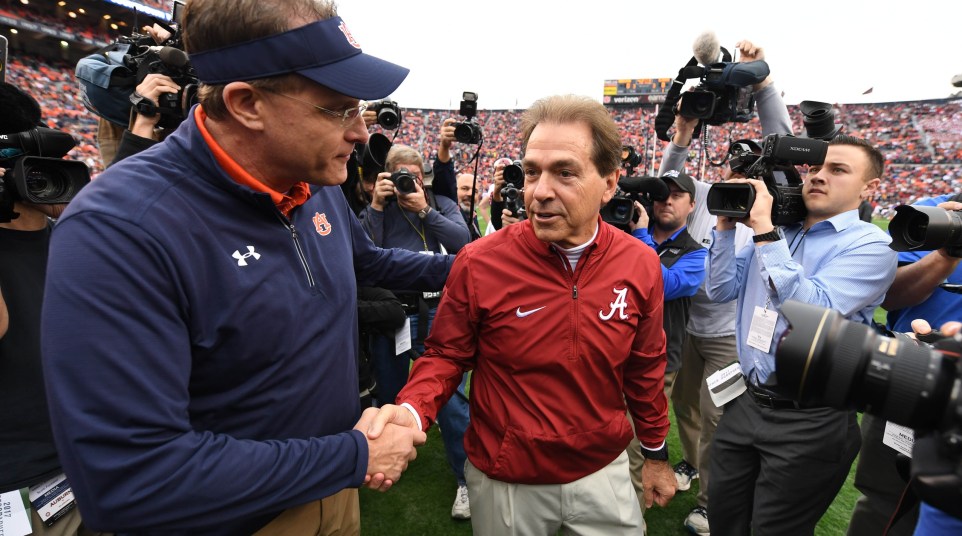
A salary cap on coaches might sound like a good idea in theory, but it'll never happen
Louisiana Governor John Bel Edwards wants change.
Edwards recently told The Advocate that he believes that salaries for college football coaches have become “obscene” and that he believes there should be a salary cap.
That comment was made weeks removed from LSU announcing that it gave defensive coordinator Dave Aranda a new, fully-guaranteed contract of 4 years, $10 million. It was the richest contract given to an assistant coach, which bested the $1.8 million that Aranda made in 2017.
The Advocate reported that in 2017 LSU paid its staff $9.4 million and was also responsible for the buyouts of 4 former coaches, one of whom was Les Miles (his buyout was roughly $7 million).
No wonder Edwards is calling for a salary cap.
LSU has become the poster child for absurd coaching contracts. The Tigers obviously aren’t alone. Texas A&M had a lump sum of $10.4 million to pay Kevin Sumlin after he was fired at the end of the 2017 season. That move was made so the Aggies could pay a 5-6 coach a salary of $7.5 million annually for the next 10 years.
How crazy were those buyout numbers? USA Today reported that fired FBS head coaches were owed more than a combined $70 million.
The data is on Edwards’ side. Unfortunately for him, the logic isn’t.

Credit: Matt Bush-USA TODAY Sports
I find it hard to believe that the NCAA is suddenly going to cap coaching salaries, no matter how crazy they get.
Why? Well, the money is coming from people who want to pay it. At places like LSU, the money to pay those obscene salaries come from private funds, not public funds. As long as boosters and private donors are willing to pay an increasingly high price to hire the right coaching staff, why is the NCAA going to put a halt to that?
The bar keeps being raised, and so do the profits. According to AL.com, Alabama football made a $45.9 million profit off the $108.2 million it earned in total revenue in 2017. That was the result of a program who won its fifth national championship in 9 years. Alabama, of course, is more of the exception than the rule. It is the standard in college football and really in all of college athletics.
So why mention the outlier program? Well, if we’re talking about capping coaches salaries, we should probably start with the head coach who had the richest contract in college football last year. Nick Saban made $11.1 million in 2017. Be my guest and tell him and coaches like Dabo Swinney, Urban Meyer and Jim Harbaugh that they can only make a certain amount every year and they need to make sure they have enough money left over for their assistants.
Goodbye, college. Hello, NFL.
The NFL doesn’t have a salary cap on its coaches. All of those awful takes about why Saban would take $15 million to coach a random NFL team gain a bit more legitimacy if you’re suddenly taking a big chunk of change out of his pocket. Besides, why would he or anyone want to have the playing field leveled just because other schools can’t keep up? The incentive of winning so much is that it creates more revenue for the school and more money for the program.
RELATED: Should college coaching staffs have salary caps? Louisiana’s Governor thinks so
I know what many people are probably thinking. Why can a coach make an 8-figure salary and leave whenever he wants while players don’t get anything? I hear you loud and clear, Jay Bilas. That doesn’t seem fair, and I’m not here to disprove that notion.
What Gov. Edwards and others are proposing isn’t about that though. It’s basically a way for the NCAA to prevent schools from spending “recklessly” on coaching salaries.
Under Edwards’ proposed idea, coaches would still make millions and athletes will still make nothing. As much as some complain about how it’s no longer amateur athletics to have such high coaching salaries, it actually bridged the gap between college and professional football. In some cases, the money is actually better in college, which is why the sport retains so many elite coaches.
Edwards is right to a certain extent. College football is an arms race. Whether the NCAA wants to admit it or not, it’s big business. The idea of programs repeatedly forking over 7- and 8-figure buyouts doesn’t seem like a sustainable business model for the individual institutions. It’s not.
Still, it’s a risk worth taking when the profit margins are so high. Elite coaches can give universities huge returns on their investments, which is why the salaries and buyouts ballooned to where they are today.
Edwards can continue to shake his head in disbelief, but as long as that basic premise exists, the NCAA isn’t making any radical changes.
